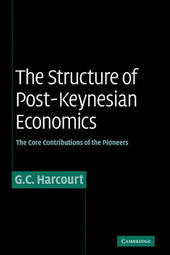
|
The Structure of Post-Keynesian Economics: The Core Contributions of the Pioneers
Hardback
Main Details
| Title |
The Structure of Post-Keynesian Economics: The Core Contributions of the Pioneers
|
| Authors and Contributors |
By (author) G. C. Harcourt
|
| Physical Properties |
| Format:Hardback | | Pages:216 | | Dimensions(mm): Height 229,Width 152 |
|
| Category/Genre | Economic theory and philosophy |
|---|
| ISBN/Barcode |
9780521833875
|
| Classifications | Dewey:330.156 |
|---|
| Audience | | Professional & Vocational | |
|---|
|
Publishing Details |
| Publisher |
Cambridge University Press
|
| Imprint |
Cambridge University Press
|
| Publication Date |
12 October 2006 |
| Publication Country |
United Kingdom
|
Description
This is a major contribution to post-Keynesian thought. With studies of the key pioneers - Keynes himself, Kalecki, Kahn, Goodwin, Kaldor, Joan Robinson, Sraffa and Pasinetti - G. C. Harcourt emphasizes their positive contributions to theories of distribution, pricing, accumulation, endogenous money and growth. The propositions of earlier chapters are brought together in an integrated narrative and interpretation of the major episodes in advanced capitalist economics in the post-war period, leading to a discussion of the relevance of post-Keynesian ideas to both our understanding of economics and to policy-making. The appendices include biographical sketches of the pioneers and analysis of the conceptual core of their discontent with orthodox theories. Drawing on the author's experience of teaching and researching over fifty years, this book will appeal to undergraduate and graduate students interested in alternative approaches to theoretical, applied and policy issues in economics, as well as to teachers and researchers in economics.
Author Biography
G. C. Harcourt is Emeritus Reader in the History of Economic Theory, University of Cambridge, Emeritus Fellow of Jesus College, Cambridge and Professor Emeritus of the University of Adelaide.
ReviewsFrom the hardback review: 'Geoff Harcourt's The Structure of Post-Keynesian Economics gives us a unique and irreplaceable perspective on the development and state of post-Keynesian thought. ...This is a labor of scholarly love both for the ideas so scrupulously presented and for the fertile minds who contributed to them.' Duncan K. Foley, Leo Model Professor, Department of Economics, New School for Social Research
|